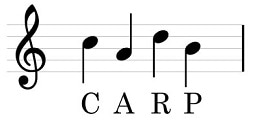AUTHOR/MUSICIAN PROFILE
E. M. Stormo is a fiction editor by day, writer by night, and a teacher and promoter of musical literacy at all times. His recent work has appeared in The Conium Review, 404 Words, Pure Slush, and elsewhere. He writes a musical blog at www.losdoggies.com.
|
Why do you play and compose music?
I compose music in my head to silence the spirit of the stairs. Lo-fi auditory hallucinations shape themselves into lyrics and earworms can be cut up into melodies.
Music is about 90% image, either of the marketable or synesthetic variety, and head-music is no different. An abstract architecture of long rhythms and tall harmonies inside one’s head gives truth to Goethe’s phrase of “frozen music” and Zappa’s dancing about it.
The old-dog composers like Scriabin (not to mention Beethoven) stopped listening to outside music in their middle-age until they only heard their own heads, if that is hearing at all, and not descending down a finely-tuned staircase.
Music is about 90% image, either of the marketable or synesthetic variety, and head-music is no different. An abstract architecture of long rhythms and tall harmonies inside one’s head gives truth to Goethe’s phrase of “frozen music” and Zappa’s dancing about it.
The old-dog composers like Scriabin (not to mention Beethoven) stopped listening to outside music in their middle-age until they only heard their own heads, if that is hearing at all, and not descending down a finely-tuned staircase.
Besides music and writing, what other creative activities do you engage in?
I draw and take long walks on the internet. I watch movies on a 9” CRT and dream of living underwater. I am also developing a universal pidgin to teach forest animals.
Who is your favorite musician or band, and why?
Even though they were one LSD jingle away from a CIA psyop, The Beatles were the best “band” there ever was or will be. In the late ‘60s, the Lennon/McCartney machine smashed pop music apart on behalf of the powers that be and retroactively birthed the psychedelic jam lying dormant at the center of the Earth. I think that’s where the doppelganger Faul McCartney came from.
Forgot the four-lads personae and the dad-rock rebranding, never mind the Crowleyan antics and black-magik Beatlemania: this band has the goods. Paul mated the outer voice with the bassline in a harmonious second marriage; John could write a bridge better than any chorus; George actually played guitar and soloed; and everyone loves Ringo.
Favorite Track: “You Know My Name (Look Up The Number”). I’m a sucker for one-line novelty songs that manage to flesh out their simple lyrics over an expansive three-part proggy pop parody of itself.
Forgot the four-lads personae and the dad-rock rebranding, never mind the Crowleyan antics and black-magik Beatlemania: this band has the goods. Paul mated the outer voice with the bassline in a harmonious second marriage; John could write a bridge better than any chorus; George actually played guitar and soloed; and everyone loves Ringo.
Favorite Track: “You Know My Name (Look Up The Number”). I’m a sucker for one-line novelty songs that manage to flesh out their simple lyrics over an expansive three-part proggy pop parody of itself.
Tell us a little about the mechanics of how you write a song.
Exactly like Sir Elton John—the Pizza Man himself, I write the melodies first, and the lyrics later or never. Just as “Rocket Man” was nothing more than a nonsense ballad in its original form, I have written many unsung Eltonesque classics translated from nothing more than a pizza ode. The ancients called it: Singing in tongues. Singing in the Spirit. And for choruses: Oujia singing.
Sir Paul might’ve dreamed up the music of “Yesterday” but the only lyrics he could recall in the morning were “scrambled eggs.” It is in this ironic dream-tongue that nonsensical head-melodies can fully lash out.
Sir Paul might’ve dreamed up the music of “Yesterday” but the only lyrics he could recall in the morning were “scrambled eggs.” It is in this ironic dream-tongue that nonsensical head-melodies can fully lash out.
Finally, what chord best represents Carp, the fish, not our website, and why?
My gut says A minor, but let’s check the staves.
In musical cryptography, the letters of words are translated into note letters using the French and Italian systems. “C” is Middle C sitting in the middle of our carp chord like a dorsal fin; next comes the “A”, which makes a minor triad with the first letter, and if the carp is anything it is a sad minor key, as can be seen in their oily eyes; for the “R”, we switch to solfeggio for a “Re” of golden sun, and in the relative C major key, that would be a D (also D in the French system); and finally, back in France where a “P” is also a B, giving us not quite a chord, but a cluster of C-A-D-B. So kind of an A minorish chord, but drowning in other nearby notes.
In musical cryptography, the letters of words are translated into note letters using the French and Italian systems. “C” is Middle C sitting in the middle of our carp chord like a dorsal fin; next comes the “A”, which makes a minor triad with the first letter, and if the carp is anything it is a sad minor key, as can be seen in their oily eyes; for the “R”, we switch to solfeggio for a “Re” of golden sun, and in the relative C major key, that would be a D (also D in the French system); and finally, back in France where a “P” is also a B, giving us not quite a chord, but a cluster of C-A-D-B. So kind of an A minorish chord, but drowning in other nearby notes.
To obtain the rhythm and feel of the fish, one would have to consume a carp and write under its effects but as a strict vegetarian in the Pythagorean sense I am unable to get so intimate with the animal, but my Piscesean intuition tells me it would probably have a splashy irregular groove with a lot of cymbals.


